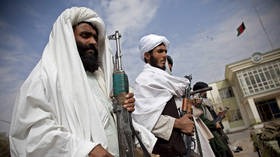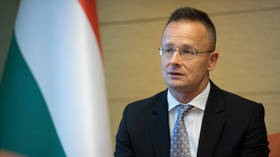The Taliban ‘Peace Deal’ Is Very Vague, the US Wants a Permanent Presence in Afghanistan
from Russia Insider:

As far as realpolitik Afghanistan is concerned, with or without a deal, the US military want to stay in what is a priceless Greater Middle East base to deploy hybrid war techniques
In this photo taken on February 21, youths and peace activists gather as they celebrate the reduction in violence, in Kandahar. A week-long partial truce took hold across Afghanistan on February 22, with some jubilant civilians dancing in the streets as the war-weary country prepared for this coming Saturday’s planned agreement on a peace deal between the Taliban and the United States. Photo: AFP / Javed Tanveer
Nearly two decades after the invasion and occupation of Afghanistan post-9/11, and after an interminable war costing over $ 2 trillion, there’s hardly anything “historic” about a possible peace deal that may be signed in Doha this coming Saturday between Washington and the Taliban.
We should start by stressing three points.
1- The Taliban wanted all US troops out. Washington refused.
2- The possible deal only reduces US troops from 13,000 to 8,600. That’s the same number already deployed before the Trump administration.
3- The reduction will only happen a year and a half from now – assuming what’s being described as a truce holds.
So there would be no misunderstanding, Taliban Deputy Leader Sirajuddin Haqqani, in an op-ed certainly read by everyone inside the Beltway, detailed their straightforward red line: total US withdrawal.
And Haqqani is adamant: there’s no peace deal if US troops stay.
Still, a deal looms. How come? Simple: enter a series of secret “annexes.”
The top US negotiator, the seemingly eternal Zalmay Khalilzad, a remnant of the Clinton and Bush eras, has spent months codifying these annexes – as confirmed by a source in Kabul currently not in government but familiar with the negotiations.
Let’s break them down to four points.
1- US counter-terror forces would be allowed to stay. Even if approved by the Taliban leadership, this would be anathema to the masses of Taliban fighters.
2- The Taliban would have to denounce terrorism and violent extremism. That’s rhetorical, not a problem.
3- There will be a scheme to monitor the so-called truce while different warring Afghan factions discuss the future, what the US State Dept. describes as “intra-Afghan negotiations.” Culturally, as we’ll see later, Afghans of different ethnic backgrounds will have a tremendously hard time monitoring their own warring.
4- The CIA would be allowed to do business in Taliban-controlled areas. That’s an even more hardcore anathema. Everyone familiar with post-9/11 Afghanistan knows that the prime reason for CIA business is the heroin rat line that finances Langley’s black ops, as I exposed in 2017.
Otherwise, everything about this “historic” deal remains quite vague.
Even Secretary of Defense Mark Esper was forced to admit the war in Afghanistan is “still” in “a state of strategic stalemate.”
As for the far from strategic financial disaster, one just needs to peruse the latest SIGAR report. SIGAR stands for Special Inspector General for Afghanistan Reconstruction. In fact virtually nothing in Afghanistan has been “reconstructed.”
No real deal without Iran
The “intra-Afghan” mess starts with the fact that Ashraf Ghani eventually was declared the winner of the presidential elections held in September last year. But virtually no one recognizes him.
The Taliban don’t talk to Ghani. Only to some people that are part of the government in Kabul. And they describe these talks at best as between “ordinary Afghans.”
Everyone familiar with Taliban strategy knows US/NATO troops will never be allowed to stay. What could happen is the Taliban allowing some sort of face-saving contingent to remain for a few months, and then a very small contingent stays to protect the US embassy in Kabul.
Washington will obviously reject this possibility. The alleged “truce” will be broken. Trump, pressured by the Pentagon, will send more troops. And the infernal spiral will be back on track.
Another major hole in the possible deal is that the Americans completely ignored Iran in their negotiations in Doha.
That’s patently absurd. Teheran is a key strategic partner to its neighbor Kabul. Apart from the millenary historical/cultural/social connections, there are at least 3.5 million Afghan refugees in Iran.
Post 9-11, Tehran slowly but surely started cultivating relations with the Taliban – but not at a military/weaponizing level, according to Iranian diplomats. In Beirut last September, and then in Nur-Sultan in November, I was provided a clear picture of where discussions about Afghanistan stand.
The Russian connection to the Taliban goes through Tehran. Taliban leaders have frequent contacts with the Islamic Revolutionary Guards Corps. Only last year, Russia held two conferences in Moscow between Taliban political leaders and mujahideen. The Russians were engaged into bringing Uzbeks into the negotiations. At the same time, some Taliban leaders met with Russian Federal Security Service (FSB) operatives four times in Tehran, in secret.
Read More @ Russia-Insider.com
Loading...



